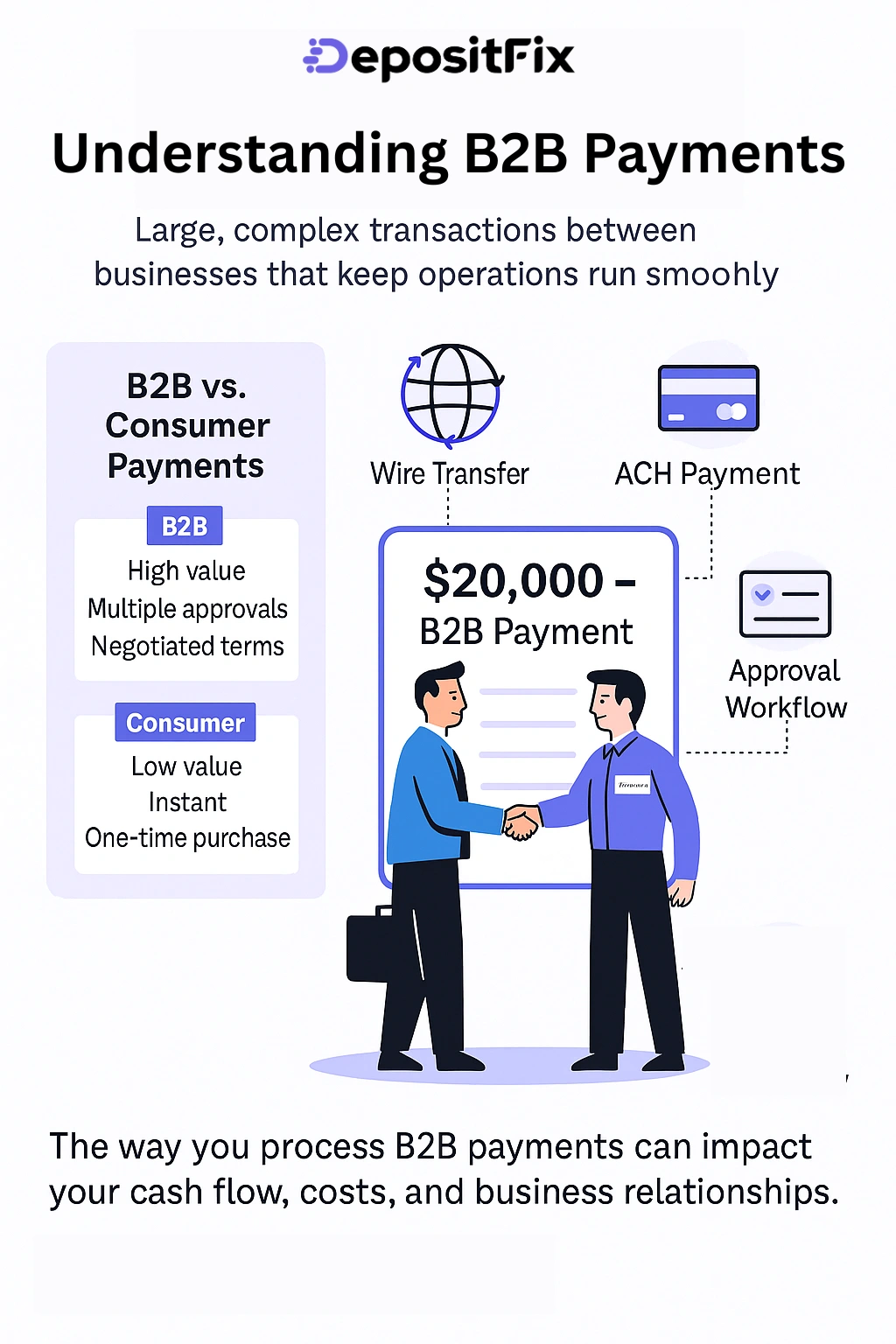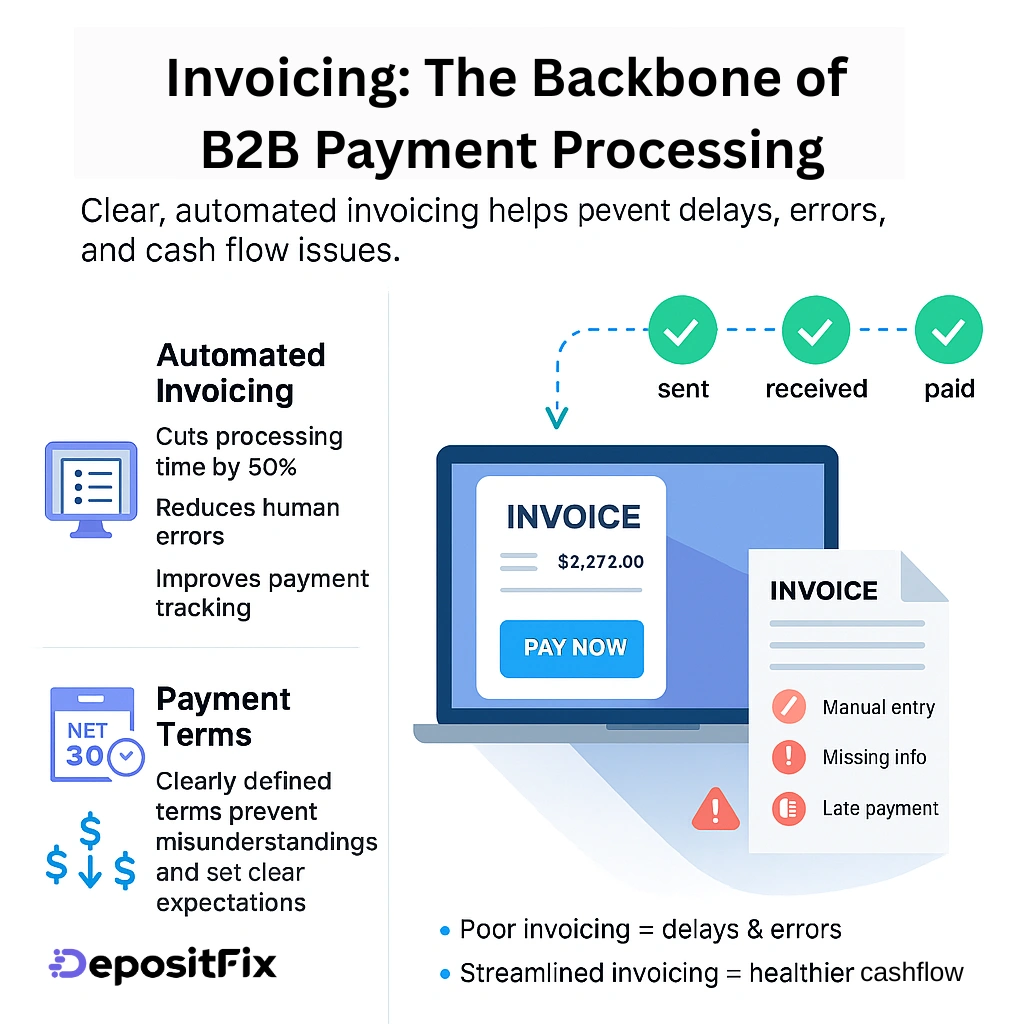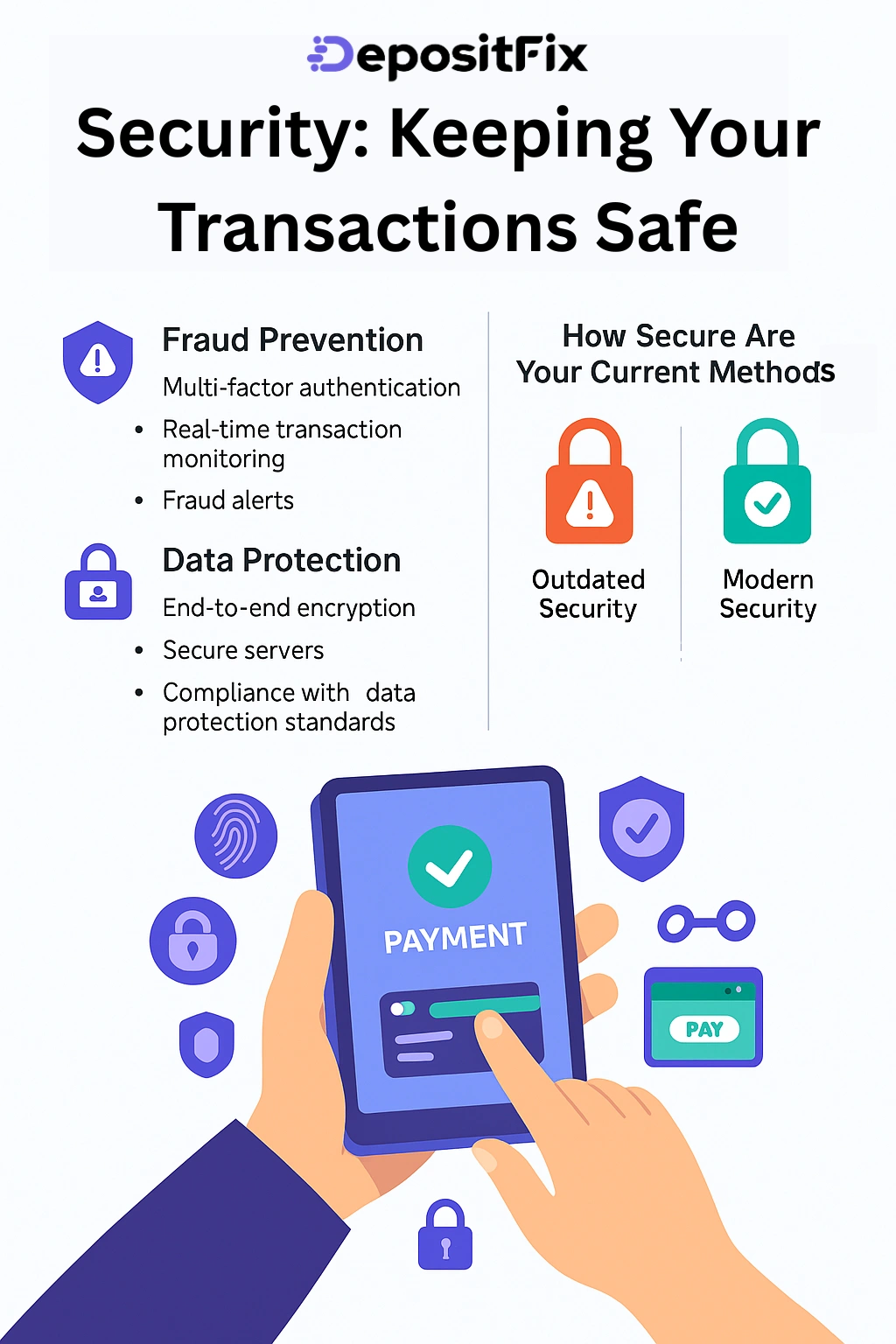Ever find B2B payments confusing? If you’re like many people, managing B2B payments can feel like a tricky puzzle.
Get this: you’re trying to juggle different payment methods, fees, and processing times, all while making sure your cash flow stays healthy. It can be overwhelming. But what if you had a roadmap to navigate this maze? What if a few smart strategies could turn this complex process into a smooth, cost-effective operation?
So, let’s break down B2B payment processing with straightforward tips to streamline your transactions and cut costs. We’ll look at the top payment methods, effective strategies, and ways to enhance transaction security.
Curious about making your B2B payments more efficient? Let’s find out how to optimize the process for you.
Ever wondered what keeps the wheels of business turning? B2B payments are the big-money transactions between companies that power everything behind the scenes. These transactions are often larger and more complex than what you'd find in consumer dealings, making them a key part of keeping your business on track. Additionally, B2B payments may require multiple layers of approval and negotiation, whereas consumer payments are generally direct and uncomplicated. Here’s a quick snapshot:
Why should you care about how these B2B payments are processed? Because the way you handle them can impact your cash flow, costs, and overall business relationships.

The supplier sends an invoice to the buyer, detailing the products or services provided, along with payment terms and due dates.
The buyer’s team reviews and approves the invoice, verifying that it aligns with the purchase order and received goods or services.
Once approved, the payment is authorized for processing. This may involve selecting the appropriate payment method.
The payment is executed and transmitted through the chosen payment method, transferring funds from the buyer’s account to the supplier’s.
The supplier confirms receipt of the payment, and both parties reconcile their records to ensure accuracy and resolve any discrepancies.

Let’s take a closer look at how B2B payments work and what you need to know:
Let’s take a look at the payment processing methods:
ACH is like a budget-friendly option. The fees are usually around $1 per transaction with a $5-10 cap for. ACH payments are ideal for businesses that handle regular, recurring transactions. While they can take a few days to process, they’re generally cheaper and quite reliable.
Convenient for smaller or recurring payments, but the fees can add up, often between 2% and 3% of the transaction amount. They’re handy but can be more expensive.
These are fast and secure but can be very pricey. They’re great for urgent transactions but might not be the most cost-effective option for every payment.
Payment gateways offer a seamless way to handle online transactions. They integrate with various payment methods and provide enhanced security features. They are ideal for businesses with high volumes of online transactions but might not be necessary for all companies.
While checks can be a low-cost option, often with minimal fees, they come with delays in processing and increased risk of fraud. They are becoming less common but can still be useful for certain types of transactions. The time to clear a check can vary, and there’s also the added administrative burden of managing them.
Cash transactions are immediate and free from processing fees, making them the most cost-effective method from a fee perspective. However, they are rarely used in B2B transactions due to security risks and the lack of a paper trail. Managing large sums of cash can also be cumbersome and impractical for many businesses.
Which B2B payment method works best for you? It often depends on your business needs and transaction sizes. Evaluating your current methods might reveal opportunities for cost savings.
Optimizing B2B payment methods to match your transaction needs can lead to significant cost savings, whether through reduced fees or more efficient B2B payment processing.
.webp)
Invoicing is where many payment issues start. Effective invoicing means fewer delays and errors in B2B payment processing.
Automating your invoicing can cut down processing times by up to 50%. It also reduces human error. Think about the time saved when you don’t have to manually track down payments or fix errors.
Clearly defining payment terms on invoices helps set expectations. For example, a 30-day payment term means the business has 30 days to pay from the invoice date.
Are your invoices helping or hurting your cash flow? If there are delays or frequent errors, it might be time to streamline the process.

Let’s take a look at the security measures:
Implementing robust fraud detection measures can prevent costly security breaches. Tools like multi-factor authentication and real-time transaction monitoring are essential.
Ensuring that your payment data is encrypted and secure is crucial. With the rise in cyber threats, investing in security is not optional.
How secure are your current payment methods? Regularly reviewing and upgrading your security measures can help prevent fraud and protect sensitive information.

Payment reconciliation is the process of matching your financial records with bank statements to ensure accuracy. It’s a crucial step in managing your cash flow and maintaining financial accuracy.
Automation tools can help streamline the reconciliation process, reducing manual errors and saving time.
Frequently reviewing your bank statements and comparing them with your records helps catch discrepancies early.
Establish a consistent reconciliation procedure to ensure all team members follow the same process, enhancing accuracy and efficiency.
Let’s see how B2B payment solutions enhance your payment operations.
One of the biggest advantages of using a dedicated B2B payment solution is the streamlining of payment processes. With features like automated invoicing, electronic payments, and reconciliation tools, these B2B payment solutions simplify complex payment workflows.
Effective B2B payment solutions can significantly enhance your cash flow management by providing real-time insights into your financial status. Tools that offer real-time tracking and reporting allow you to monitor payments and manage your cash flow more effectively.
Effective B2B payment solutions not only streamline your operations but also strengthen your relationships with vendors. Timely and accurate payments contribute to a positive business relationship and build trust.

When selecting a B2B payment solution, consider these factors to find the best fit for your business needs:
Choosing the right B2B payment solution can significantly impact your business’s efficiency, security, and financial management. To ensure you select a platform that meets your needs, here are some key features to consider:
One of the most valuable features of a B2B payment solution is the ability to automate invoicing and B2B payment processing for efficient management of accounts receivable (AR). Automation not only reduces manual errors but also speeds up the payment cycle.
A seamless integration with your existing ERP (Enterprise Resource Planning) and accounting systems is crucial for maintaining consistency and accuracy across your financial operations.
For businesses dealing with international transactions, multi-currency support is essential. It allows for handling B2B payments in different currencies, reducing conversion costs and complexities.
Security is paramount when dealing with financial transactions. Look for B2B payment solutions with advanced security features to protect sensitive data and prevent fraud.
Real-time reporting and analytics capabilities provide valuable insights into your payment activities, helping you make informed decisions and manage cash flow more effectively.
B2B payment processing doesn’t have to be overwhelming, right? The goal is simple: smoother transactions, lower costs, and a healthier cash flow. And remember, it’s not just about getting paid—it’s about building stronger relationships with your vendors and clients along the way.
For those looking to simplify their B2B payment processes even further, DepositFix offers solutions that help businesses manage transactions seamlessly, making the whole process easier and more efficient.
Discover the hidden automation in your payment, billing and invoicing workflows. Talk to our experts for a free assement!
